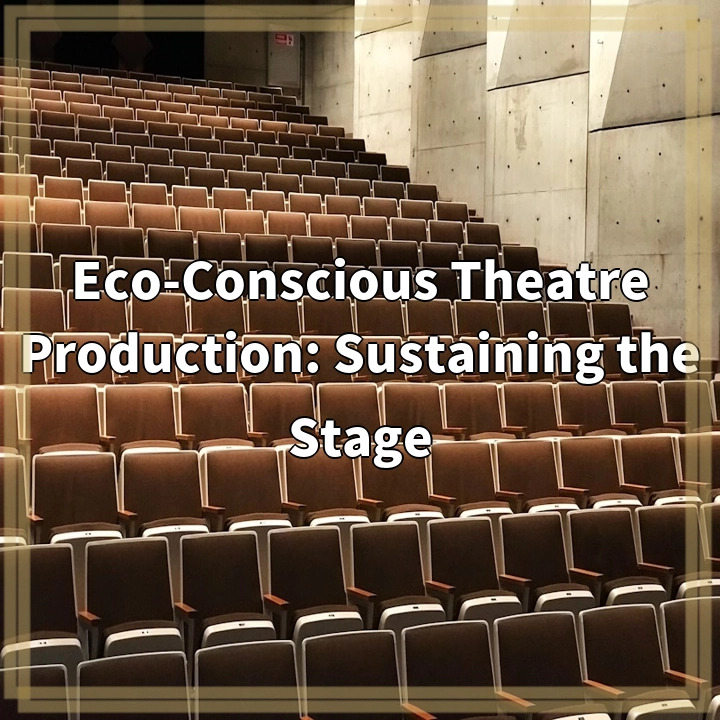Physical Address
304 North Cardinal St.
Dorchester Center, MA 02124
Physical Address
304 North Cardinal St.
Dorchester Center, MA 02124

Eco-Conscious Theatre Production is an innovative approach to staging performances that prioritize environmental sustainability and minimize the ecological impact of theatrical productions. It goes beyond traditional practices by incorporating eco-friendly materials, energy-efficient technologies, and sustainable production processes into all aspects of theatre production, from set design and construction to costume creation and audience engagement.
While conventional theatre production can be resource-intensive and generate significant waste, eco-conscious theatre aims to address several environmental challenges prevalent in the industry.
Traditional theatre productions often result in excessive waste generation, including discarded set pieces, props, and costumes. These materials end up in landfills, contributing to environmental pollution and resource depletion. Eco-conscious theatre production seeks to minimize waste by utilizing reusable, recycled, or repurposed materials, and promoting responsible consumption and disposal practices.
Theatrical productions can be energy-intensive, with excessive electricity usage for lighting, sound systems, and backstage operations. Eco-conscious theatre production focuses on reducing energy consumption through the use of energy-efficient lighting equipment, renewable energy sources, and the adoption of sustainable energy management practices.
Traditional theatre productions often rely on the use of various chemicals, such as paints, adhesives, and cleaning agents, which can be harmful to human health and the environment. Eco-conscious theatre production promotes the use of non-toxic, eco-friendly alternatives and encourages responsible chemical management practices to minimize negative impacts.
Water-intensive activities in theatre production, such as costume washing and set construction, can contribute to excessive water consumption. Eco-conscious theatre production aims to reduce water usage by implementing water-efficient processes, promoting water recycling and reuse, and raising awareness among cast, crew, and audience members about the importance of water conservation.
Theatre productions often involve extensive transportation of equipment, materials, and performers, resulting in a significant carbon footprint. Eco-conscious theatre production aims to reduce emissions by prioritizing local sourcing, minimizing transportation distances, promoting public transport options for cast and crew, and offsetting unavoidable emissions through carbon offset programs.
By addressing these real-world problems, eco-conscious theatre production seeks to create a more sustainable and environmentally responsible approach to the art form, ultimately contributing to the preservation of our planet for future generations.
Eco-conscious theatre production offers practical solutions to address the environmental challenges associated with traditional theatrical practices. By implementing these solutions, the industry can contribute to a more sustainable future.
To minimize waste generation, eco-conscious theatre production emphasizes the use of reusable, recycled, or repurposed materials. It also promotes responsible consumption and disposal practices, encouraging the recycling and donation of set pieces, props, and costumes.
To reduce energy consumption, eco-conscious theatre production focuses on using energy-efficient lighting equipment and adopting sustainable energy management practices. It explores the use of renewable energy sources, such as solar or wind power, and promotes the efficient use of energy during backstage operations.
Eco-conscious theatre production encourages the use of non-toxic, eco-friendly alternatives to harmful chemicals traditionally used in theatre productions. This includes selecting non-toxic paints, adhesives, and cleaning agents, as well as promoting responsible chemical management practices.
To reduce water consumption, eco-conscious theatre production implements water-efficient processes, such as using water-saving technologies for costume washing and promoting water recycling and reuse. It also raises awareness among cast, crew, and audience members about the importance of water conservation.
Eco-conscious theatre production tackles the carbon footprint of theatrical productions by prioritizing local sourcing to minimize transportation distances. It encourages the use of public transportation options for cast and crew and offsets remaining emissions through carbon offset programs.
By adopting these solutions, the theatre industry can embrace sustainability and contribute to a greener future, while still delighting audiences and telling impactful stories on stage.
If you’re wondering where the article came from!
#